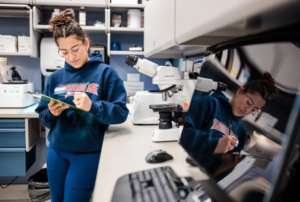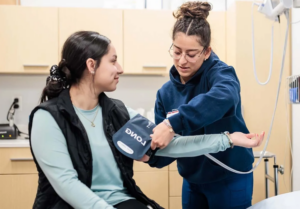About the Program
One of the biggest challenges facing the public health field is the question, What is Public Health? If you ask different people in the community, some may answer, “health care for the poor,” while others might say “washing your hands,” “protecting our food,” “passing smoke-free policies,” or perhaps given our experiences today “protecting us from infectious diseases like COVID-19.” The truth is that all these statements are correct. The American Public Health Association states that Public Health promotes and protects the health of people and the communities where they live, learn, work and play.
At MSU Denver, a degree in public health will give the student a broad understanding of the public health field, while allowing students to gain experience in focused specialties of public health practice.
By completing the public health core, students will have skills to understand basic public health functions such as monitoring and assessing the health of communities, identifying health problems and priorities, and implementing evidence-based strategies to promote population health, as well as advanced functions such as planning various health programs and policies to serve the Healthcare needs in the community.
The required curriculum was designed to build student knowledge and skill in eleven Public Health Competency Domains identified by the Counsel on Public Health Education (CEPH), which is an accreditation body and sets quality benchmarks in the field. Students that graduate with a degree in Public Health will be prepared for many entry-level public health positions, while also providing the background knowledge required to pursue a broad range of graduate degree programs, including a Masters in Public Health (MPH) or a Masters in Health Administration (MHA).
Public Health Student Spotlight
Closing the equity gap
After witnessing her family’s challenges, this student decided to be an agent for change in her community.
Julianna Montoya has experienced the best and worst of Colorado’s health care system.
Montoya, a double major in Public Health and Biology, knew she was on the right path from the moment she took her first class with Erin Seedorf, Dr.PH, assistant professor in the Department of Health Professions. And connecting with numerous Health Institute programs further solidified her resolve.
“It was striking — all of the patients looked like me,” Montoya said. “Even more so, I overheard moms telling their daughters, ‘You see her? That could be you someday.’ “To be able to be in that space and help others see they belong — I’m just overwhelmed with gratitude.”
“Public health connects us all — I love it,” Montoya said. “And I never forget that we’re sending patients back to their families to tell the stories shaping their experiences with health care.”
This is Public Health
The Association of Schools of Public Health (ASPH) designed a campaign “This Is Public Health” to let people know that public health affects them on a daily basis and that we are only as healthy as the world we live in.
This is Public Health
Contact Us to Learn More!

If you are interested in Public Health but have more questions, please contact us!
You can set up an advising appointment with Dr. Erin Seedorf by emailing at [email protected] .
You can also request an advising appointment on our Academic Advising Webpage.
Career Opportunities
Public Health has a broad range of professional areas suited to a variety of interests and skills, in both traditional public health, service-focused organizations, as well as new practice settings, including private and non-profit organizations. Public health graduates can look forward to a wealth of opportunities in each state and city of the country and even other countries around the world. Common areas of employment include federal, state, and local health agencies, consulting firms, consumer advocacy organizations, hospitals and integrated health care systems, non-government and private business and industry.
According to the website, Careers in Public Health.Net (2020) there is a growing list of 173 public health positions and related careers with average salaries between $40,000- $200,000 annually. US News & World Report states that public health graduates of all levels : associates degrees through doctoral degrees, can find a range of jobs in both public and private sectors. Primary areas for public health employment fall into these main categories: epidemiology, biostatistics, healthcare research, chronic and acute illness, applied healthcare projects, environmental & occupational health, health education & behavioral sciences, infectious disease, public policy, global health, nutrition, and maternal child health. Given the current challenges of a global pandemic, there are even higher chances of continued growth in these professional areas.
For more information on Colorado Careers in Public Health, visit the Colorado Public Health Career Pathway.
Introduction to Public Health Careers

Principles of Public Health - Career Launch Pad
Striving for healthier communities
Public health is a fast-paced and critical component of our healthcare system. The field promotes and protects the health of people and their communities.
The Principles of Public Health course provides a historical context for the development of the public health field, reviews the public health infrastructure and workforce, and explores the application of evidence-based practices addressing public health issues our communities face today.
Public Health offers career paths in government, nonprofit organizations, healthcare, and education.
The public health field is experiencing a bright outlook in Colorado. The state expects to see 85,000 related job positions in 2025.
Public Health Major, B.A.
It is highly recommended that General Studies and Support Courses be completed prior to enrolling in Public Health courses. The Public Health Major requires the following required courses. In addition to the courses listed below, many courses will require prerequisite courses prior to registration.
Summary of Major Requirements
Required Core Courses: 45 Credits
Required Elective Courses: 3 Credits
Required Support Courses: 6 Credits
Total for Major: 54 Credits
Course Information
- PUB 1000 Principles of Public Health (Credits: 3) (HCM 190A is an equivalent)
- HCM 2010 Global Health Systems (Credits: 3)
- SLHS 2990 Introduction to Health Communication (Credits: 3)
- PSY 2310 Statistics for Social and Behavioral Sciences (Credits: 3)
- ITP 3200 Ethics in Health Care (Credits: 3)
- ITP 3450 Dynamics of Disease (Credits: 3)
- PUB 3010 Community Health Survey, Assessment & Health Improvement Planning (Credits: 3) (HCM 3650 is an equivalent)
- PUB 3020 Introduction to Epidemiology in Public Health (Credits: 3) (HCM 3651 is an equivalent)
- PUB 3030 Essentials of Environmental Health in Public Health Practice (Credits: 3) (HCM 3652 is an equivalent)
- HCM 3700 Health Disparities in the US (Credits: 3)
- PUB 3000 Health Behavior Theory and Practice (Credits: 3)
- PUB 4000 Health Policy- Practice & Development (Credits: 3)
- PUB 4010 Health Program Planning, Implementing, and Evaluation (Credits: 3)
- ITP 3980 Field Experience (Senior Experience) (Credits: 3*)
*NOTE: This course should be taken when at least 80% of the major coursework in completed
Core Options Course: In addition to the courses above, pick one of the provided required course options:
- ITP 4700 Community Health Education and Lifestyle Medicine (Credits: 3)
OR - HCPS 3000 Introduction to Patient Navigation (Credits: 3)
OR - ITP 3850 Lifestyle Medicine (Credits: 3)
- HCM 3100 – Entrepreneurship in Health (Credits: 1)
- HCM 3150 – Health Care Organization and Management (Credits: 3)
- HCM 3200 – Managing Quality in Health Care (Credits: 2)
- HCM 3400 – Human Resources Management in Health Care (Credits: 3)
- HCM 3550 – Leadership in Health Care (Credits: 1)
- HCM 3800 – Long-Term Care: Managing Across the Continuum (Credits: 3)
- HCPS 3000 – Introduction to Patient Navigation (Credits: 3)
- HLDR 1100 – Colorado Tourism and Recreation (Credits: 3)
- HSP 1010 – Introduction to Human Services (Credits: 3)
- HSP 1020 – Introduction to Trauma Informed Care (Credits: 3)
- HSP 2010 – Introduction to High-Impact Nonprofit Organizations (Credits: 3)
- HSP 2760 – Social Media for Social Change (Credits: 3)
- HSP 2780 – Building A Sustainable Nonprofit (Credits: 3)
- HSP 3460 – Addiction, Immunity, and Infectious Diseases (Credits: 2)
- HSP 3510 – The People of Nonprofits: Staff, Board, Volunteers, Clients and You (Credits: 3)
- HSP 3560 – Motivational Interviewing (Credits: 2)
- HSP 3575 – Motivational Interviewing for Health Professionals (Credits: 3)
- HSP 3860 – Social Entrepreneurship (Credits: 3)
- HSP 4030 – Grantwriting for Social Change (Credits: 3)
- HSP 4450 – Nonprofit Financial Management and Financing (Credits: 3)
- ITP 1700 – Medical Terminology (Credits: 2)
- ITP 2800 – Health, Society, and the Environment (Credits: 3)
- ITP 2950 – Wellness Coaching I (Credits: 3)
- ITP 3000 – Men’s Health (Credits: 3)
- ITP 3100 – Health Education and Counseling (Credits: 3)
- ITP 3700 – Physiology of Aging (Credits: 3)
- ITP 3800 – Stress and Sleep: Impact on Health and Disease (Credits: 3)
- ITP 3850 – Lifestyle Medicine (Credits: 3)
- ITP 4100 – Women’s Holistic Health (Credits: 3)
- ITP 4400 – Wellness Coaching II (Credits: 3)
- ITP 4550 – Advanced Health Navigation and Assessment (Credits: 3)
- ITP 4700 – Community Health Education and Lifestyle Medicine (Credits: 3)
- ITP 4800 – Lifestyle Medicine Across Gender and Lifespan (Credits: 3)
- ITP 4950 – Community Coaching for Health (Credits: 3)
- NUT 2040 – Introduction to Nutrition (Credits: 3)
- NUT 3350 – Global Nutrition and Health (Credits: 3)
- NUT 3500 – Food Safety (Credits: 3)
- NUT 4210 – Community Nutrition (Credits: 3)
- SLHS 3000 – Foundations of Disability Studies through Media (Credits: 3)
- SWK 1600 – Community Engagement and Civic Responsibility (Credits: 3)
- SWK 3030 – Social Work with Older People (Credits: 3)
- SWK 3120 – Privilege, Oppression, and Power (Credits: 3)
- Add “PHI 1030 – Introduction to Ethics or PHI 1110 – Language, Logic & Persuasion (Credits: 3)
- ITP 1500 – Dynamics of Health (Credits: 3)
Public Health Minor
The undergraduate minor in Public Health will provide students with a basic understanding of the Public Health field by exploring social, cultural, and biological dimensions of health.
The Public Health Minor requires the following courses and electives. In addition to the courses listed below, many courses will require prerequisite courses prior to registration.
Summary of Minor Requirements
Required Core Courses: 15 Credits
Required Elective Courses: 3 Credits
Total for Minor: 18 Credits
Course Information
Public Health Foundation (Credits: 6)
- PUB 1000 Principles of Public Health (Credits: 3) (HCM 190A is an equivalent)
- PUB 3020 – Introduction to Epidemiology in Public Health (Credits: 3) (HCM 3651 is an equivalent)
Study in Health Science
Pick ONE of the following course options (Credits: 3)
- ITP 1500 – Dynamics of Health (Credits: 3)
- ITP 3450 – Dynamics of Disease (Credits: 3)
Public Health Foci
Pick ONE of the following course options (Credits: 3)
- PUB 3000 Health Behavior Theory and Practice (Credits: 3)
- PUB 3010 Community Health Survey, Assessment & Health Improvement Planning (Credits: 3) (HCM 3650 is an equivalent)
- PUB 3030 Essentials of Environmental Health in Public Health Practice (Credits: 3) (HCM 3652 is an equivalent)
- PUB 4000 Health Policy- Practice & Development (Credits: 3)
- PUB 4010 Health Program Planning, Implementing, and Evaluation (Credits: 3)
- PSY 2310 – Statistics for Social and Behavioral Sciences (Credits: 3)
- MTH 1201 – Introduction to Statistics (Credits: 3)
- HCM 3500 – Health Research Methods (Credits: 3)
- ANT 1010 – Introduction to Biological Anthropology (Credits: 3)
- BIO 1000 – Human Biology for Non-Majors (Credits: 3)
- HCM 2010 – Global Health Systems (Credits: 3)
- HCM 3100 – Entrepreneurship in Health (Credits: 1)
- HCM 3150 – Health Care Organization and Management (Credits: 3)
- HCM 3200 – Managing Quality in Health Care (Credits: 2)
- HCM 3400 – Human Resources Management in Health Care (Credits: 3)
- HCM 3500 – Health Care Research Methods (Credits: 3)
- HCM 3550 – Leadership in Health Care (Credits: 1)
- HCM 3700 – Health Disparities in the U.S. (Credits: 3)
- HCM 3800 – Long-Term Care: Managing Across the Continuum (Credits: 3)
- HCPS 3000 – Introduction to Patient Navigation (Credits: 3)
- HLDR 1100 – Colorado Tourism and Recreation (Credits: 3)
- HSP 1010 – Introduction to Human Services (Credits: 3)
- HSP 1020 – Introduction to Trauma Informed Care (Credits: 3)
- HSP 2010 – Introduction to High-Impact Nonprofit Organizations (Credits: 3)
- HSP 2760 – Social Media for Social Change (Credits: 3)
- HSP 3460 – Addiction, Immunity, and Infectious Diseases (Credits: 2)
- HSP 3860 – Social Entrepreneurship (Credits: 3)
- HSP 4030 – Grant writing for Social Change (Credits: 3)
- ITP 1500 – Dynamics of Health (Credits: 3)
- ITP 1700 – Medical Terminology (Credits: 2)
- ITP 2700 – Holistic Health (Credits: 3)
- ITP 2800 – Health, Society, and the Environment (Credits: 3)
- ITP 3000 – Men’s Health (Credits: 3)
- ITP 3100 – Health Education and Counseling (Credits: 3)
- ITP 3200 – Ethics in Health Care (Credits: 3)
- ITP 3450 – Dynamics of Disease (Credits: 3)
- ITP 3700 – Physiology of Aging (Credits: 3)
- ITP 3800 – Stress and Sleep: Impact on Health and Disease (Credits: 3)
- ITP 3850 – Lifestyle Medicine (Credits: 3)
- ITP 4550 – Advanced Health Navigation and Assessment (Credits: 3)
- ITP 4700 – Community Health Education and Lifestyle Medicine (Credits: 3)
- MTH 1210 – Introduction to Statistics (Credits: 4)
- NUT 2040 – Introduction to Nutrition (Credits: 3)
- NUT 3350 – Global Nutrition and Health (Credits: 3)
- NUT 3500 – Food Safety (Credits: 3)
- NUT 4210 – Community Nutrition (Credits: 3)
- PSY 2310 – Statistics for the Social and Behavioral Sciences (Credits: 3)
- PUB 3000 – Health Behavior Theory and Practice (Credits: 3)
- PUB 3010 – Community Health Survey, Assessment and Health Improvement Planning (Credits: 3)
- PUB 3030 – Essentials of Environmental Health in Public Health Practices (Credits: 3)
- PUB 4000 – Health Policy – Practice and Development (Credits: 3)
- PUB 4010 – Health Program Planning, Implementation, and Evaluation (Credits: 3)
- SLHS 2990 – Introduction to Health Communication (Credits: 3)
- SLHS 3000 – Foundations of Disability Studies through Media (Credits: 3)
- SWK 1600 – Community Engagement and Civic Responsibility (Credits: 3)
Community Health Worker Certificate
The MSU Denver Community Health Worker Certificate will provide students with the knowledge and skills needed to fulfill established Colorado Community Health Worker Core/Professional Competencies in the field and practice of Community Health Workers. Community Health Workers (CHWs) are critical members of the public health workforce that link communities to health and social programs to promote access to services and improve the quality and cultural responsiveness of care delivery.
The certificate includes 5 required courses (see below section) that align with the Colorado CHW Core/Professional Competencies. Students who complete the 5 courses will have demonstrated the acquisition of knowledge and skill in these identified competency areas. Students must maintain a “C” or better in all courses, and minimum GPA of 2.0 to earn the certificate.
The MSU Denver Community Health Worker Certificate program will be part of the Statewide CHW training structure, which will include a credentialing process. Upon completion of a credentialing exam, students may be entered into a statewide Community Health Worker Registry. For more information on this Statewide Community Health Worker structure, please visit the Colorado Department of Health & Environment, Community Health Worker Workforce website: http://cdphe.colorado.gov/community-health-worker-workforce-development
Required Courses
Community Health Worker Certificate
- PUB 1000: Principles of Public Health (Credits: 3)
- PUB 2000: Community Health Worker Fundamentals (Credits: 3)
- PUB 3010: Community Health Survey, Assessment and Health Improvement Planning (Credits: 3)
- ITP 3450: Dynamics of Disease (Credits:3)
- PUB 4030: Advanced Community Health Worker (Credits: 3)
Total: 15 credits
Community Health Education Certificate
Earning the CHE certificate signifies a high level of education and expertise, and it allows students to sit for Community Health Education Specialist (CHES) exam conducted by the National Commission for Health Education Credentialing (NCHEC). The CHES exam is required or preferred qualification in the field of community and public health / health promotion, and certification allows work in a variety of healthcare settings, such as hospitals, clinics, insurance companies, government agencies, and educational institutions like schools and universities.
The certificate totals 27 credit, with 9 required courses, 3 credit hours each. These courses align with National Commission for Health Education Credentialing’s (NCHEC) competency areas. Students must complete the 9 courses with a grade of “C” or better. There is an optional course that students can take if they are interested in learning about Peer Health Education in the area of Public Health.
Required Courses
Community Health Education Certificate
- PUB 1000: Principles of Public Health (Credits: 3)
- PUB 3000 Health Behavior Theory and Practice (Credits: 3)
- PUB 3010 Community Health Survey, Assessment & Health Improvement Planning (Credits: 3)
- PUB 3020 – Introduction to Epidemiology in Public Health (Credits: 3)
- ITP 3200 Ethics in Health Care (Credits: 3)
- HCM 3500 Health Research Methods (Credits: 3)
- HCM 3700 Health Disparities in the US (Credits: 3)
- PUB 4000 Health Policy- Practice & Development (Credits: 3)
- PUB 4010 Health Program Planning, Implementing, and Evaluation (Credits: 3)
Suggested Course: PUB 4010 Peer Health Education (this is a senior experience, service-learning course, and will require in-person work in metro high schools. While this is not required, it is highly recommended for experience purposes.
TOTAL: 27 credits (+3 if suggested course is added)
Accreditation
Academic Accreditation is an assurance of the quality of an academic program. The Higher Learning Commission (HLC) is an independent corporation that was founded in 1895 as one of six regional institutional accreditors in the United States. HLC accredits degree-granting post-secondary educational institutions in the North Central region, including Colorado and 18 other states. The mission of the HLC is to serve the common good by assuring and advancing the quality of higher learning. For more information, please visit the Higher Learning Commission.
As a new program, launching Fall 2021, the Public Health program will be seeking accreditation by the Council on Education for Public Health (CEPH). For more information about this accreditation process, please visit: http://ceph.org/
Need Assistance?
Visit our Department Support Portal.Accepting applications, apply now!
Apply nowRequest information about our program
Request more informationCall or Email Us
303-615-1200
[email protected]
Visit Us
Central Classroom Building 220
1055 10th Street, Ste. 220, Denver, CO 80204
To get assistance, please visit our Department Support Portal.
Mailing Address
Department of Health Professions
Metropolitan State University of Denver
Campus Box 33, PO Box 173362
Denver, CO 80217-3362



